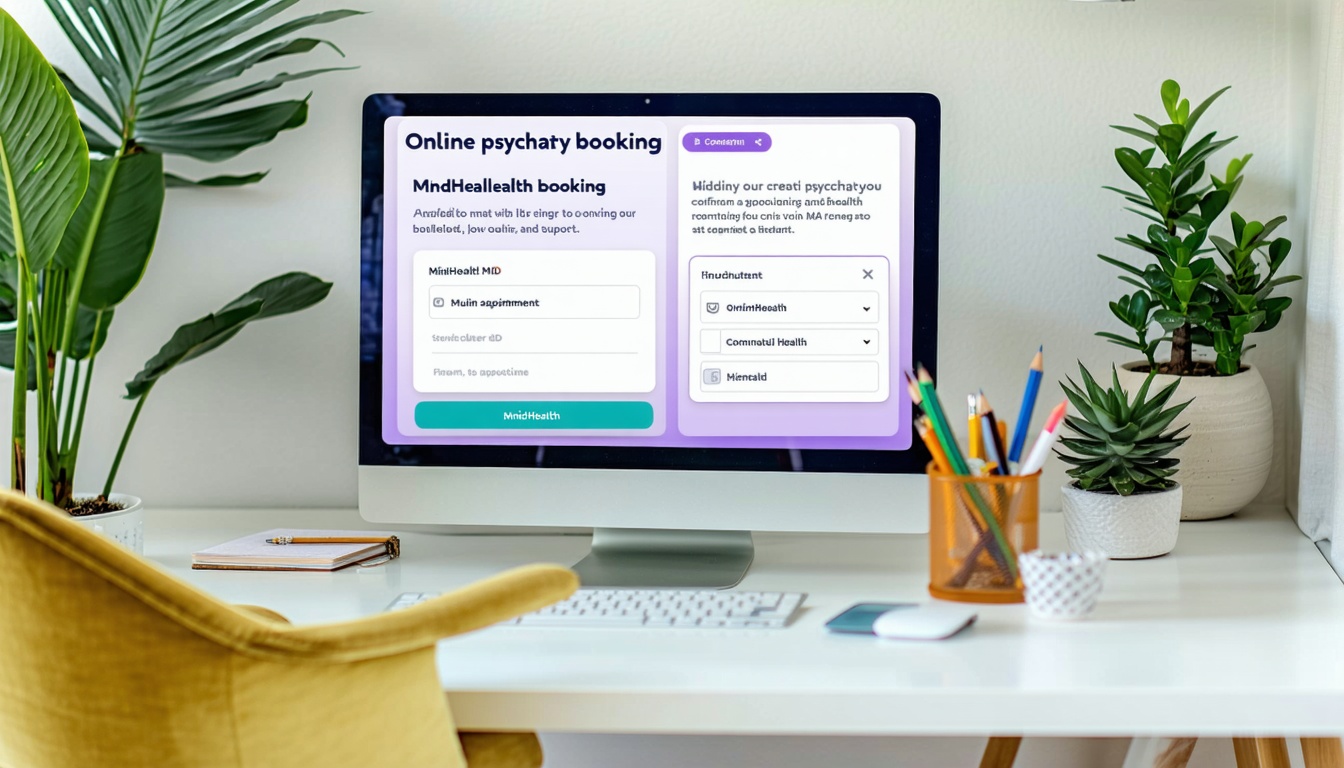Understanding the value of a virtual psychiatry session
If you’re exploring ways to take charge of your mental health, a virtual psychiatry session can be a meaningful first step. This approach makes psychiatric care more accessible, allowing you or a loved one to connect with a professional counselor, therapist, or psychiatrist in real time, without the hassle of in-person travel. Whether you’re balancing hectic work schedules, living far from a mental health facility, or simply looking for discreet care, the online route can make life easier.
One of the biggest reasons people choose a virtual appointment is convenience. You can skip traffic, reduce wait times, and find the perfect quiet spot at home, so your therapy or medication management session doesn’t upend the rest of your day. Many individuals also find it comforting to attend sessions in the privacy of their personal space, which can lower anxiety and encourage more open conversations.
Moreover, choosing an industry-leading provider like MindHealth MD can give you access to telehealth psychiatry, Medication Assisted Treatment (MAT), and TMS (Transcranial Magnetic Stimulation) services, all in one place. By merging advanced technology with human compassion, MindHealth MD strives to create effective and accessible support. And since virtual psychiatry has shown comparable effectiveness to in-person therapy (according to Verywell Mind), you’re not sacrificing quality for convenience.
In this post, you’ll see how online psychiatric care compares to traditional sessions and how the unique options at MindHealth MD can help you or a loved one on a journey toward better mental well-being. We’ll also explore how services like MAT and TMS fit into an online model, what to expect with insurance coverage, and how you can get started.
Comparing in-person and online care
Not long ago, the idea of receiving therapy or psychiatric treatment online seemed unusual. However, in recent years, telehealth has soared in popularity. In fact, mental health professionals observed that telehealth therapy sessions had higher attendance rates than in-person sessions, especially around the time of the COVID-19 pandemic [1].
Identifying the benefits
- Comfort in your own surroundings: By meeting remotely, you can relax in your familiar environment. This often lowers barriers to being open about life’s challenges.
- Scheduling flexibility: Online therapy platforms usually offer extended hours, weekends, or evening sessions.
- Limited downtime: You don’t have to factor in a commute or rearrange your day substantially just to see your provider.
Recognizing the drawbacks
- Technology glitches: A spotty internet connection or an outdated device can lead to frozen screens, audio issues, or dropped calls. According to a 2022 survey by the American Telemedicine Association, 35% of patients encountered at least one technical issue during their telehealth appointments [2].
- Reduced face-to-face cues: While online video sessions still let you see your psychiatrist or therapist, some nonverbal cues can be trickier to pick up through a screen. This can hamper the natural flow of conversation if you or the therapist has trouble reading body language.
Ultimately, research suggests that online sessions produce clinical outcomes comparable to in-person care. A study by the NIH found no significant difference in improvement between telehealth and traditional sessions, even in partial hospitalization programs [3]. So, if you’re worried about the effectiveness of virtual care, rest assured that telehealth services can be just as impactful as visiting a provider in person.
Why choose MindHealth MD
If you’re concerned about finding the right telehealth psychiatry provider, MindHealth MD is designed to stand out in several ways. From specialized professionals to flexible scheduling, their approach is all about helping you feel supported and confident as you move forward with urgent or ongoing mental health concerns.
Specialized expertise
MindHealth MD boasts psychiatrists who can diagnose various mental health issues, develop individualized treatment plans, and even prescribe medication when necessary. These experts understand how mental and physical health intersect, ensuring they address each aspect of your well-being. If you need prescription assistance, psychiatric medication management is available to keep you on track with the right dosage and approach.
Beyond medication, MindHealth MD also offers therapy and behavioral counseling. You’ll find genuine, knowledgeable practitioners who emphasize whole-person care. Because everything is virtual, you can pick a time that’s truly convenient, whether that’s early in the morning, after the kids are asleep, or on a weekend.
Personalized appointments
Feel free to explore telepsychiatry appointment options if you’re seeking flexible psychiatric care with minimal disruption to your schedule. The individualized focus is invaluable for those who want a deep, one-on-one connection with their provider, but also value the ability to choose when and where sessions take place.
How medication assisted treatment fits in
Medication Assisted Treatment (MAT) is a strategy that uses approved medications alongside counseling to treat substance use disorders, such as opioid or alcohol dependency. This approach helps stabilize brain chemistry, reduce cravings, and boost the likelihood of long-term recovery. If you or a loved one is struggling with substance use, MAT can make all the difference in regaining control and leading a healthier, more productive life.
Benefits of MAT in a virtual setting
- Reduced stigma: Sometimes, it’s difficult to seek help in person due to fear of judgment. With telehealth, you can consult your psychiatrist privately.
- Frequent follow-ups: Since you won’t need to travel for each check-in, keeping your scheduled appointments is simpler, and that consistency often leads to better outcomes.
- Accessible resources: In some communities, in-person addiction treatment services are limited or hard to reach. Virtual care expands your options significantly.
When you choose MindHealth MD, you can tap into medication assisted treatment for opioid or alcohol use, among other substance-related conditions. They also provide specialized options like mat for opioid addiction or mat for alcohol dependency if you’re dealing with those issues specifically. Medications, such as buprenorphine or naltrexone, might be used in tandem with therapy sessions, all done in a remote format to ensure flexibility and privacy.
Understanding TMS for further support
Transcranial Magnetic Stimulation (TMS) is a non-invasive treatment that uses magnetic pulses targeting specific areas of the brain linked to mood regulation. This can be especially helpful for people who haven’t seen the desired results from traditional methods, such as standard medication or talk therapy.
Why consider TMS
- Proven effectiveness: TMS has showcased significant improvement in symptoms of treatment-resistant depression, anxiety, and other conditions (American Psychiatric Association mentions TMS in broader contexts of mental health solutions).
- Minimal side effects: Unlike some psychiatric medications that come with side effects ranging from drowsiness to weight gain, TMS has a relatively low side-effect profile.
- Outpatient procedure: You can receive treatment and still go about your day afterward.
Integrating TMS with telepsychiatry
While TMS itself is performed in person through specialized equipment, you can still manage evaluations, consultations, and follow-ups via virtual appointments. MindHealth MD enables you to arrange sessions, coordinate schedule tms treatment, and stay updated on your progress.
If you’d like to learn more about TMS therapy for depression, consider tms therapy for depression, where you can explore how the procedure works and discover if it’s suitable for your condition. The convenience of telehealth check-ins means you spend less time in transit and more time focusing on your mental health.
Addressing common worries
It’s natural to feel a little uncertain about online mental health care. You might worry if it’s too impersonal or if technical issues could harm your sessions. However, as numerous studies show, telehealth is an effective, well-received platform. According to the American Psychiatric Association, telepsychiatry is equivalent to in-person care in diagnostic accuracy, treatment effectiveness, and overall satisfaction.
Potential concerns and solutions
- Privacy: If you’re concerned about someone overhearing your session, find a private space or use headphones. MindHealth MD follows HIPAA-compliant protocols, protecting your personal data in an online format.
- Technical barriers: You only need a stable internet connection, a device with video capability, and a safe, confidential room for your appointment. If you’re unsure, a quick tech check or tutorial can make it smoother.
- Connection issues: While 24% of Americans still lack broadband at home, per a 2023 Pew Research Center study [2], many telehealth providers (including MindHealth MD) have user-friendly options for phone calls when video isn’t feasible.
If life circumstances make it hard to keep seeing an in-person psychiatrist, or if you just prefer counseling from the comfort of your living room, telepsychiatry can address those obstacles. You can also consider a short term psychiatry session when you need immediate support or want to test things out before committing to a longer-term online plan.
Checking insurance and costs
The cost of any mental health service matters, especially when you’re considering multiple sessions or advanced procedures like TMS. Thankfully, insurance recognition of telehealth services has expanded. An Act called the Paul Wellstone and Pete Domenici Mental Health Parity and Addiction Equity Act requires some insurers to provide comparable mental health coverage to medical coverage. But insurance coverage still varies.
How it works at MindHealth MD
MindHealth MD accepts a variety of insurance plans, helping more individuals access care. If you want to confirm whether your coverage extends to telehealth psychiatry, check out insurance accepted psychiatry. You’ll see which providers are in-network and get a clearer sense of any out-of-pocket costs. If you prefer to handle payments on your own, you can also look into a straightforward self pay psychiatry session.
Typical session fees
Sessions may fall between $65 and $109, based on factors like therapist expertise, appointment length, or additional services [1]. Higher-level care like TMS may have different out-of-pocket costs, but again, your insurance coverage can dramatically reduce these expenses if the service is in-network.
Steps to begin your session
Now that you know how telepsychiatry can make a positive shift in your mental health journey, you might be curious about how to get started. Fortunately, the process is straightforward and user-friendly, particularly when you’re working with an established provider like MindHealth MD.
1. Explore your options
Start by browsing what’s available. Do you need quick support for anxiety? If so, you might consider a book anxiety treatment. If depression is the main concern, a depression psychiatry appointment might be your next step. And if you’re facing a more urgent situation, an immediate psychiatry appointment or a same day psychiatric evaluation could be crucial.
2. Check logistics
Before scheduling a virtual psychiatry session, confirm that your home or workspace has the necessary speed for video calls. If you’re worried about technical difficulties, do a test run to ensure both audio and video function clearly. Also, gather any relevant health records, medication lists, or prior mental health documents, so your provider has a complete picture.
3. Book your appointment
When you’re ready, you can online psychiatry booking or call to speak with a representative. During your initial appointment, you’ll talk through your symptoms, concerns, and history, giving the psychiatrist the insight needed to develop a potential treatment plan.
4. Follow through
Consistency is the secret ingredient to success in mental health care. If you’re prescribed medication, make sure to attend your follow-up sessions for psychiatric medication management. If you’re recommended TMS, set aside the time needed and check any in-person requirements. If MAT is part of your treatment, maintain frequent contact with your psychiatrist for best results.
Overcoming additional challenges
Sometimes mental health conditions go beyond what straightforward talk therapy or standard medication can handle. Conditions like PTSD, OCD, or co-occurring disorders often benefit from a multi-tier strategy.
Coordinated care matters
MindHealth MD excels at addressing deeper mental health challenges, such as in a ptsd psychiatric care plan. They can also tackle co-occurring conditions through an expert-led co occurring disorders treatment program that merges therapy, medication, and other supportive elements. By collaborating across specializations, they ensure you’re receiving care that targets every facet of your mental health.
Further diagnostic support
Advanced tests can refine your care. For instance, an eeg brain mapping test can offer deeper insights into brainwave patterns, assisting psychiatrists in creating a more tailored plan. If you’re curious about how that process supports mental health decisions, explore the eeg diagnostic for mental health or eeg for treatment planning for additional clarity.
Frequently asked questions
Below are some questions people commonly have before starting a virtual psychiatry session. While each person’s situation is unique, these answers can serve as a helpful guide.
1. Is telepsychiatry really as effective as in-person care?
Yes. Multiple studies, including research by the NIH [3], reveal that telehealth can yield clinical outcomes similar to in-person sessions. Effectiveness depends more on the consistency of treatment and your engagement rather than the form of communication.
2. What if I have poor internet access?
A stable connection is ideal for video sessions. However, if your broadband is inconsistent, you might still arrange phone-based appointments. It’s also possible to switch to phone if you’re partway through a video session and encounter technical issues.
3. How do I prepare for the first session?
Try to find a private, comfortable space, free from distractions. Have details about current medications, any relevant medical history, and a short list of what you’d like to discuss. If it’s a more time-sensitive need, consider scheduling a 48 hour psychiatry booking or an adult psychiatry intake appointment.
4. Are TMS and MAT options available virtually?
Medication Assisted Treatment (MAT) can be managed remotely, including follow-up care and therapy. TMS requires in-person visits for the actual procedure, but evaluations and ongoing discussions can happen online. At MindHealth MD, you can coordinate both TMS and MAT seamlessly, ensuring you get all the support you need in a format that works for you.
5. Will my insurance cover online sessions?
Though insurance coverage varies, many plans now include telehealth services. MindHealth MD has in network psychiatry care and in network tms providers for eligible participants. If you’re unsure, you can check your policy or speak directly with a MindHealth MD team member to confirm your coverage.
By now, you’ve seen how a virtual psychiatry session at MindHealth MD can provide cost-effective, timely, and personable care, whether you’re dealing with depression, anxiety, addiction, or other concerns. Thanks to telehealth flexibility, you can pursue treatments like MAT, coordinate TMS consultations, and keep up with your medication management without rewriting your entire schedule.
Taking that first step often feels daunting, but remember, expert help is only a few clicks away. Consider reaching out to MindHealth MD to book a telepsychiatry appointment or discover additional options for specialized care. If you stay consistent, communicate openly, and stay engaged in your treatment plan, you’ll be on a promising path toward improving your mental well-being.








